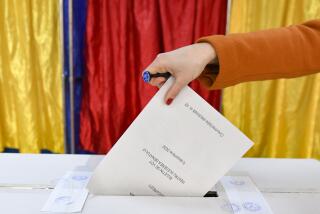Most Americans See Military Balance, Oppose Spending Increase
- Share via
WASHINGTON — A majority of Americans now believe that a favorable military balance has been restored with the Soviet Union and strongly support efforts to achieve arms control but opposes further increases in military spending, according to a survey made public Saturday by the Chicago Council on Foreign Relations.
The study of foreign policy attitudes, conducted last fall and rechecked in January, was prepared by the Gallup Organization, which has carried out similar mid-term surveys for the council every four years since 1974. To gauge public opinion, the group interviewed a nationwide random sample of 1,585 adults. It also questioned 343 prominent individuals from government and the private sector to develop a “leadership sample” which differed from the general public on several specific issues.
The initial results were retested in mid-January to determine the degree to which the Iran- contra crisis affected public opinion. The most significant finding, paralleling the results of other polls, was that there had been a decline in public support for President Reagan’s overall foreign policy and specifically for his handling of terrorism.
Asked whether they thought the United States or the Soviet Union was stronger, 48% of the public sampled and 59% of the leadership group said in January they thought the two superpowers were “about equal” in military strength, while 28% of both groups rated the United States as the stronger. In the council’s 1982 survey, 42% of the public and 62% of the leaders perceived military equality between the two powers.
On relations with Moscow, the survey found that 80% of the public and 95% of the leaders favored negotiation of arms control agreements. Lesser majorities of both groups endorsed resuming educational, scientific and cultural exchanges and increasing grain sales. However, majorities also favored placing limitations on the sale of advanced computers and opposed the sharing of technical information on defense against missile attacks.
In the defense spending area, the survey found 55% of both the public and leadership samples in agreement that outlays should be held at the $282.2-billion level set in fiscal 1987.
While reversal of the perception of Soviet military superiority “represented a triumph for the Reagan Administration’s arms build-up,” the report said, “it may have undermined support for a continuation of that build-up.”
In other areas, the 40-page report found:
--That intervention by U.S. troops would be supported by 68% of the U.S. public in the event of a Soviet invasion of Western Europe and by 53% if the Soviets were to invade Japan. Majorities opposed use of U.S. troops if North Korea should invade South Korea; if Arab forces should again try to invade Israel; if a new Arab embargo cut this country off from Middle East oil supplies; if Nicaragua invaded Honduras to destroy contra bases; if the government of El Salvador faced defeat by Marxist-led rebels.
--That a majority of the public was ready last fall to back President Reagan’s policies on terrorism, with 62% supporting use of force against terrorists even if innocent people are killed and 59% opposing negotiations with terrorists. But overall support for the Administration’s anti-terrorist performance fell from 44% in October to 28% in January, following disclosures of the Iran arms deals.
--That concern about economic issues has fallen sharply since 1982, when 64% of the public and 53% of leaders made unemployment their top concern, as against 26% of the public and 7% of leaders last fall. But 57% of the leadership sample expressed concerns about the continuing federal deficit, an increase of 45% since the 1982 survey.
--That majorities of the public would regard a Communist takeover of any non-Communist nation as “somewhat of a threat,” but only in the case of Mexico did a majority (62%) see “a great threat” in such an event. Only 27% of the public and 16% of the leaders felt that a takeover of El Salvador would pose “a great threat.”
More to Read
Sign up for Essential California
The most important California stories and recommendations in your inbox every morning.
You may occasionally receive promotional content from the Los Angeles Times.













